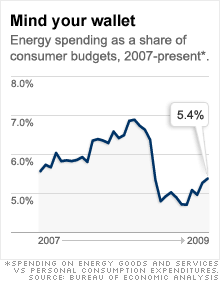Rising fuel prices hit consumers
The government's key inflation measure came in higher than expected due to a 6.3% jump in oil and gas prices.
NEW YORK (CNNMoney.com) -- Consumer prices in October were essentially unchanged from a year ago, the government reported Wednesday, as the rising cost of oil and gas offset earlier price declines.
The Consumer Price Index, the government's key inflation reading, is now down only 0.2% during the past 12 months compared to the same period a year ago. This is the smallest 12-month rate of decline since February.
The so-called core CPI, which is more closely watched by economists because it strips out volatile food and energy prices, is up 1.7% over the past year.
For the month, overall prices rose 0.3%. Economists surveyed by Briefing.com had forecast a 0.2% rise.
The core CPI rose just 0.2% in the month, but that was higher than the forecast of a 0.1% increase.
A 6.3% rise in fuel prices in the month helped feed the overall monthly increase. The prices of other forms of energy increased in October as well, with electricity costs up 0.6% and natural gas prices rising 1.9%.
Still, overall energy prices are 14% below where they were in October of 2008.
The price of oil fell sharply last fall in the wake of the financial crisis and the resulting cut in global demand. But with oil prices on the rise again it is likely that the 12-month change in CPI will be back in positive territory later this year.
The latest report also showed vehicle prices jumping, with new car prices up 1.6%, while used car prices rose 3.4% in the month.
The roll out of 2010 models, depleted inventories caused by shuttered auto plants earlier this year and a surge in buying this summer from Cash for Clunkers helped lift prices.
But the prices of many other goods were little changed. Food prices rose only 0.1% while apparel prices declined 0.4%.
The Federal Reserve has repeatedly said that it does not see any broad inflationary pressures on the horizon. That view has allowed the central bank to concentrate on trying to fix the battered U.S. economy through low interest rates and trillions of dollars pumped into the system through various lending programs.
But some economists said there were some troubling signs of inflation beyond the rise in energy in the October CPI report.
Mark Vitner, senior economist at Wells Fargo Securities, points out that the price of goods other than food and energy rose at a higher rate over the last 12 months, than the price of services, which includes everything from medical care to airline tickets. That's the first time this has happened in 26 years.
Services providers typically face less overseas competition than manufacturers. So the price of services should, in theory, rise at a higher rate.
But Vitner said he's worried that the sharp decline in the value of the dollar means that the price of all types of goods will increase in the future. That's because overseas exporters will be less likely to put downward pressure on prices with cheaper goods.
Vitner said he believes at least part of the price increases for vehicles is due to the large share of cars that are either imported or produced here by Asian manufacturers. And he added that the relatively rare price increase for personal computers and peripherals in October is also a sign of the weak dollar.
"Imports have been helping to contain prices," he said. "If the dollar is close to free fall, it has to have more of an impact on inflation."
But Keith Hembre, chief economist for First American Funds, said he doesn't think the weak dollar will add much to pricing pressures. He said as long as unemployment remains high and wages weak, Americans won't have the money necessary to feed inflation.
"I'm afraid it's very difficult to see any upward pressure on wages over the next few years," he said. "If wages and income aren't growing, price increases won't be sustainable."
Neither Hembre nor Vitner believe the Fed will change its inflation outlook, or its policy, simply because the overall CPI will likely soon turn positive for the first time in nearly a year.
But Vitner said he's worried that the positive CPI will feed into inflation worries among investors. That can push bond yields higher, raise mortgage rates for consumers, and increase the cost of loans businesses need to invest in their operations or hire workers.
"Perception counts a lot more on Wall Street than it does with the Fed," he said. "When we start to see higher year over year numbers, it will feed the already lingering doubts about how well the Fed will be able to contain inflation." ![]()


